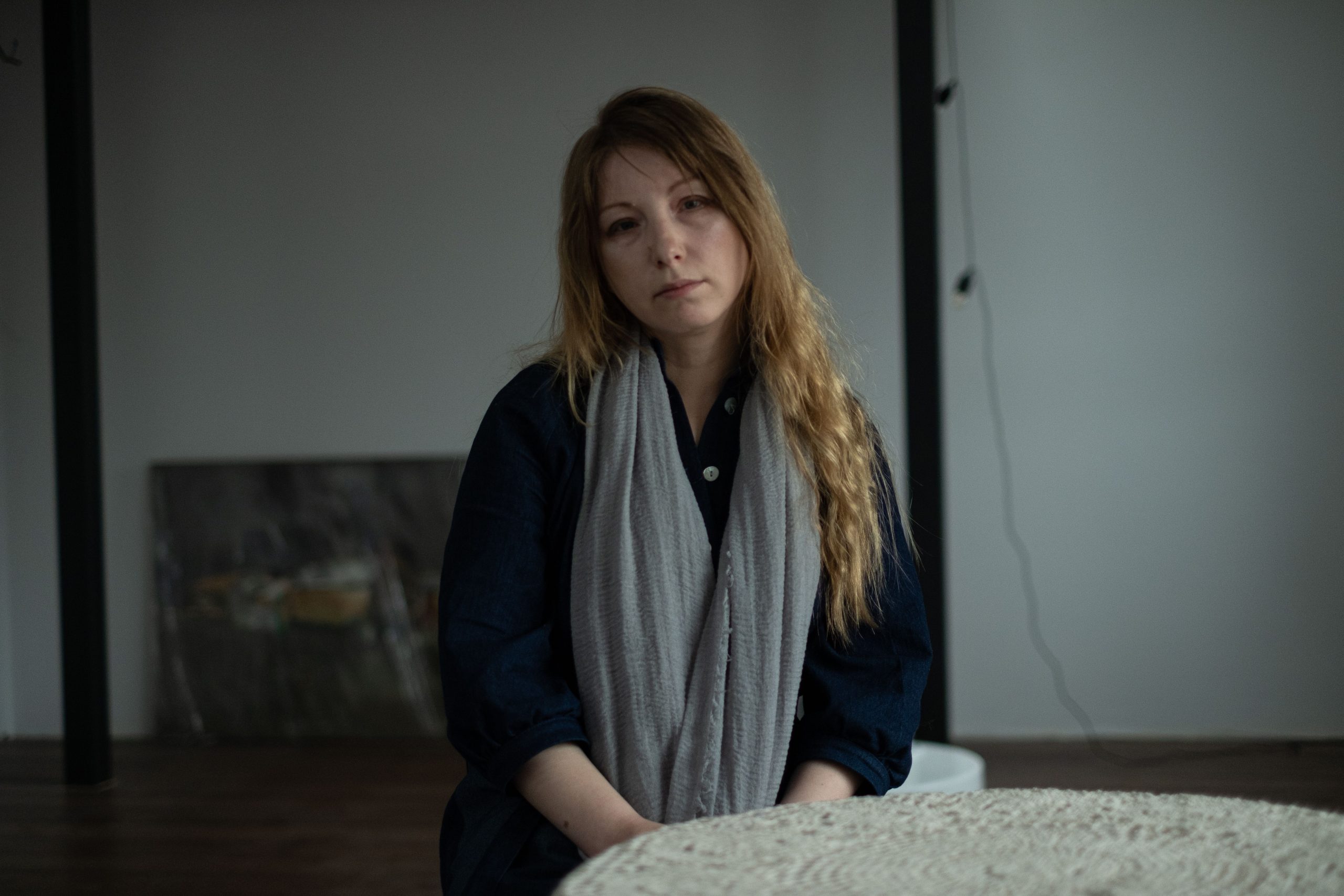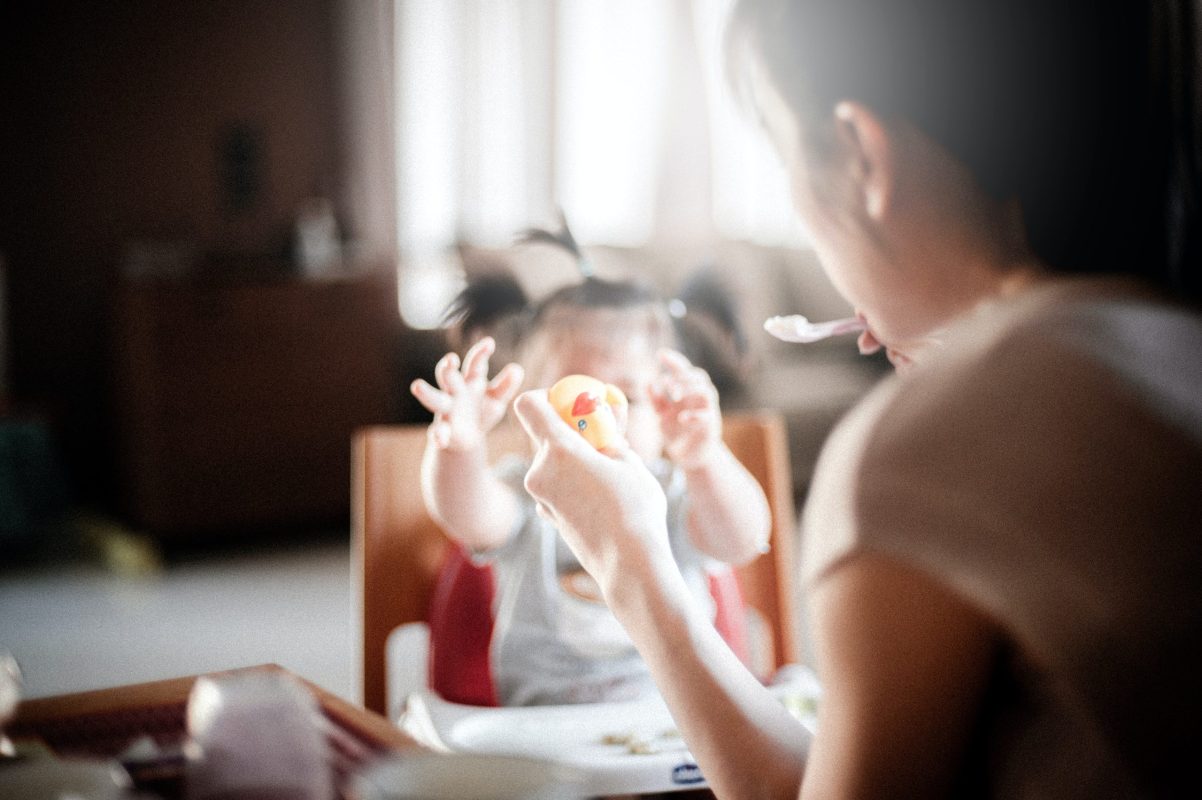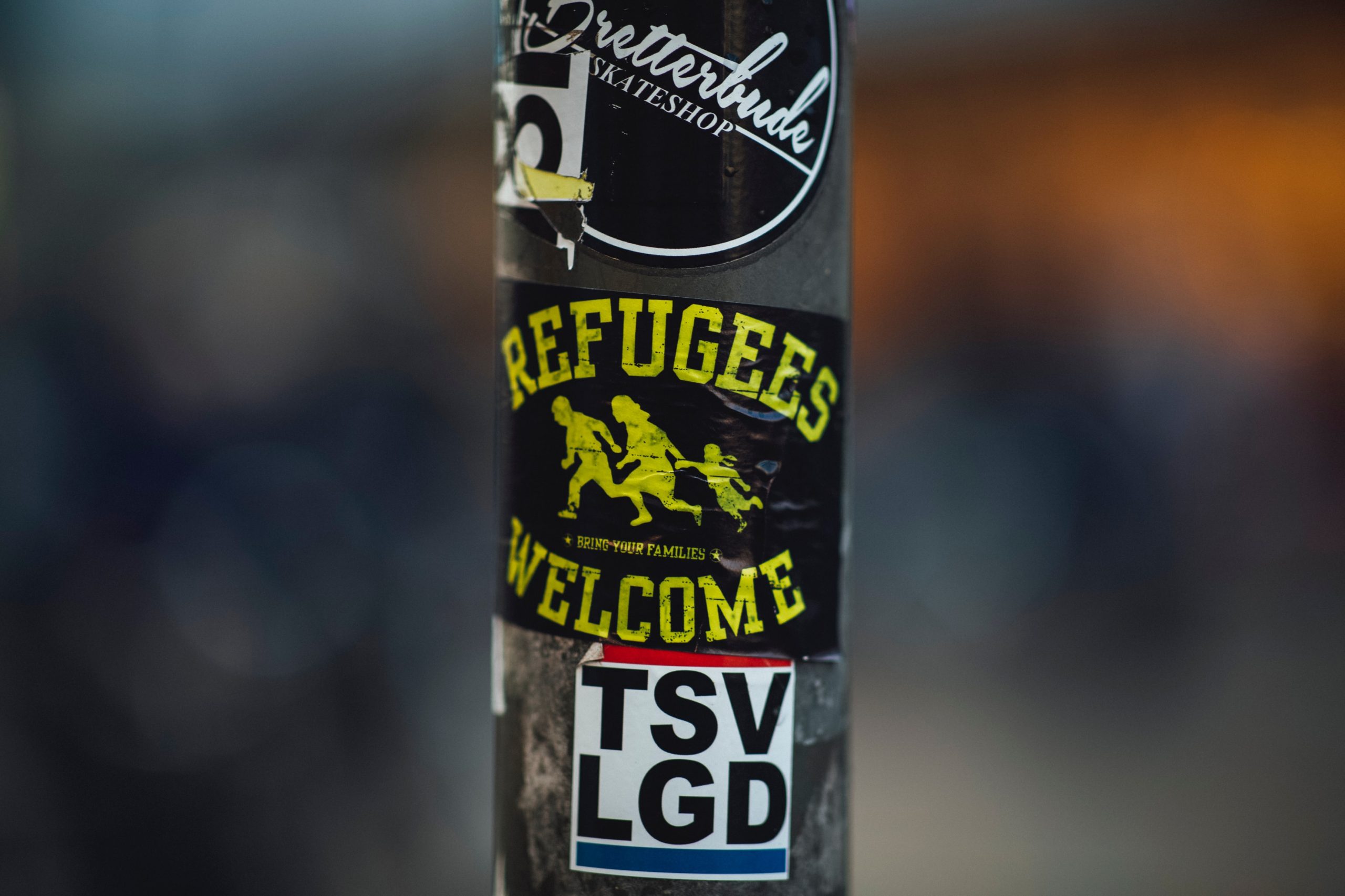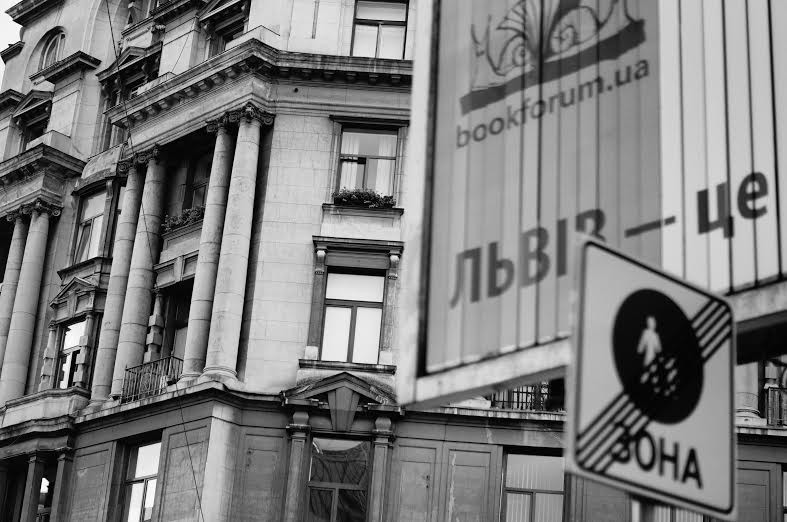essays
Solo Dancing With an Invisible Partner in Rynok Square
Moments of hope, resilience, and joy are as visceral and important as images of war for Ukrainians

In 2013, Ostap Slyvynsky, a writer and translator who lives in Lviv, was invited by a composer friend to collaborate on a performance for a music festival in Donetsk, shortly before the city was occupied by pro-Russian militants. “It was very vibrant,” Ostap recalled. “There was a huge arts community there, and they created an arts center from an old factory, incorporating cables, insulation materials, industrial waste.”
For the performance, which was to be called In Preparation, Ostap would prepare the kind of emergency kit that is now second nature for Ukrainians: a change of underwear, a few sweaters, a keepsake, toiletries, pills. The performance involved Ostap counting out pills as if for a prolonged absence, but also as a kind of meditative act—“just to concentrate, just to find balance,” Ostap told me. “One, two, three, four, five.”
Ostap rehearsed for weeks, but the performance in Donetsk never happened. In 2014, after an uprising overthrew Ukraine’s pro-Russian President, Russian-backed separatists took over Donetsk. The vibrant arts center, made of recycled building materials, is today a notorious prison.
As the first air raid sirens pierced the morning silence in Lviv, Ostap was completely unprepared.
Earlier this year, Ostap’s composer friend contacted him again to see if he would like to resurrect their collaboration. Ostap was no longer interested. Too much time had passed. He could no longer relate to the mood of anxiety that had inspired it. “I said ‘No, I don’t feel it any more—it’s not actual for me’.” He cracks a wry, weary smile. “Who could predict?” he said. A few weeks later, as the first air raid sirens pierced the morning silence in Lviv, Ostap was completely unprepared. He had not, as advised on countless TV channels and in newspapers, packed an emergency kit. On February 24, he found himself jostling for an ATM machine to see if he could still access his savings. He was able to withdraw 2000 hryvnia, or about $68. “I was so happy to have money in my hands,” he said.
Ostap told me this story as we were sitting in Black Honey, a cramped, noisy coffee shop on Halytska Street near the center of Lviv. Outside a slow river of people drifted by in the pale winter sun. We were entering the second month of a war but, on the surface, it wasn’t immediately obvious. There were buskers in the street, balloon sellers, a woman with angel wings who let people take her photograph for tips. But you didn’t have to rub too hard at the surface to see what lay beneath.
On TV, images of war are visceral by necessity. Collapsed buildings, bombed out tanks, an endless parade of hollow-eyed refugees peering through the windows of buses, of trains, of cars. The rescued cat, the forlorn dog. But when you are in a city like Lviv, the images that linger are quieter, less graphic. For me it was a mug in a public bathroom of a small art gallery on a quiet street in Lviv. The mug held random toothbrushes, a tube of toothpaste. A box of tampons sat nearby.
A young Ukranian novelist, Vadym, had taken me to the gallery one afternoon. He was keen to see an exhibition of drawings depicting Russian violence. They were raw and furious and filled with splayed limbs and blood, and I didn’t much like them, but what struck me was the rooms in which the art was projected on a wall. As my eyes adjusted to the gloom I could pick out the outlines of abandoned sleeping bags, pillows with soft indentations. Someone slept there last night. A lot of someones. The toothbrushes, of course, were theirs. Later I would see the same makeshift dorms in other public spaces—a yoga studio, a waiting room at the station, a library. A parallel universe, as in a children’s story—on one side the art gallery; on the other, the scrambled lives of refugees unsure if they would ever get home; unsure if home even still existed. Private lives made public.
In a small adjoining courtyard, I sat at a small bistro table with a coffee and watched a young man and his friends fussing over a puppy. They talked in soft voices, smiling, at ease. Would they be sleeping in the gallery tonight?
What he could do, he discovered, was collect the stories of other people while he assisted refugees at Lviv train station.
For Ostap, an intense literature professor in a hoodie, the first few weeks of war interrupted what he considered his writing rhythm. Too much heightened tension, too much adrenaline. What he could do, he discovered, was collect the stories of other people while he assisted refugees at Lviv train station. He was a fan of Polish writer Czeslaw Milosz who had spent the Second World War in Warsaw and translated most of Shakespeare’s plays during the Nazi occupation. Milosz also wrote a series of fragmentary poems, conjuring scenes of his childhood—roosters on fences, fog like a river flood. At the train station, it was these ideas that floated into Ostap’s mind. “Each poem is a kind of definition of a very simple word, like street or house, or—for example—Europe, and how it looks from inside an occupied city,” said Ostap. “I thought it would be interesting to collect this kind of war vocabulary, but from the stories of other people.”
My seventh or eighth coffee of the day had arrived—small, European coffees that I always finished too fast—and as I stirred in my sugar and tried to pace myself, Ostap read a few of his stories. For the letter “A,” a short anecdote about apples in which a woman, Anna recalled trying to sleep in a bathtub in Kyiv during a night of shelling. In the dark she began to imagine the shells as ripe apples falling from a tree, a memory drawn from her early life—a night in the Carpathian mountains, young and in love, in a bed not much more comfortable than that bathtub:
“Now, I was falling asleep to the explosions, and I heard those apples. I wanted so badly for it to be just those garden apples hitting the ground around us.”
On another day, volunteering at a shelter, Ostap watched a woman who had arrived alone, and had chosen not to share any stories. She was from Donetsk. What trauma had she gone through? “All of a sudden she took her phone,” said Ostap. “She called someone and said, ‘Hello, how are you, let’s count together,’ and she began to count.”
Ostap counts above the high-pitched scream of the coffee machine, “One, two, three, four, five.” Then the woman from Donetsk interrupted whoever was at the end of the line. A child, perhaps? “Slower, slower, concentrate, don’t hurry.” She returns to the beginning. One, two, three, four, five.
Ostap thought of his show that never played in Donetsk, counting pills just for balance. One, two, three, four.
Through the window of Black Honey I could see the imposing statue of Danylo Romanovych, the 13th century warrior king of Galicia–Volhynia, and founder of Lviv (named for his son, Lev). It was Danylo who set the city, and the region, on a westward tilt—attracting immigrants from Poland and Germany, as well as Jews from Kyiv, that colors it to this day. A common refrain in Lviv is that its rich bohemian history has long made the city a target for Russian antagonism.
A common refrain in Lviv is that its rich bohemian history has long made the city a target for Russian antagonism.
“They always try to portray my city as a nationalist center,” the writer and poet Victoria Amelina told me one morning, over another cappuccino in a different coffee shop, this one tucked inside a bright, airy children’s bookstore.
Of all the people I meet in Lviv, Victoria is the most indignant, the most scathing of Russia and Russians. She was born the year of the Chernobyl catastrophe, the year the Soviet Union began to disintegrate. “My parents were told that it was safe, and my mom recalls walking me in a stroller through radioactive clouds over Lviv.” Now she radiates quiet fury. While Putin talks about defending the Russian-speakers of Ukraine, Victoria remembers only that her parents made her speak Russian, out of fear. “They didn’t want their children to suffer as they had,” she said. “I’ve had to reclaim my Ukrainian language—it would be easier for me to write in Russian.” At home she has a library of Russian books, mostly classics. She will never read them again. “I can now read Dickens in English, why would I read him in Russian?” she says. How about Dostoevsky? Has reading Crime & Punishment become complicated? “No, it’s not complicated,” she said. “I just understand now that this mysterious Russian soul is not so mysterious: They want to suffer, they thrive on it, and they want us to suffer.”
Viktoria remembered watching the war in Chechnya on Russian TV, as a child in the 90s. “I thought that Chechnya was doing something wrong, not that Russia was killing Chechens,” she said. “So propaganda worked on me, too. I thought that Russians were saving Chechnya, like they are saving me now—thank you so much, but I don’t need to be saved.”This was how our conversation went for an hour. I thought of something Milan Kundera wrote in a 1984 essay for The New York Review of Books that the aspiration of Central Europe was to be a group of nations conceived according to one rule: the greatest variety within the smallest space. “How could Central Europe not be horrified facing a Russia founded on the opposite principle: the smallest variety within the greatest space?” Kundera wrote.
When war comes to a country, it is unequal in its attentions. During the time I’d been in Lviv, and despite daily air raid warnings, and a nightly curfew, and armed police, and monuments surrounded by sandbags or steel barriers, it was sometimes possible to believe you were in a normal city doing normal tourist things. One afternoon, I found myself buying bath salts for friends in a tiny shop near the ruins of the city’s great synagogue, destroyed during the Second World War. “Lviv Souvenir Soap Manufacture,” said a sign on the door. “No days off.” Another day, enjoying the sun, I browsed an outdoor book stall. Later I bought an ice cream.
But, of course, the city is no more normal than that jar of toothbrushes in the bathroom of an art gallery. “I’ve never seen the city more crowded,” Ostap remarked when we emerged one evening into the street. Those crowds are swollen by refugees, at least 200,000 of them. Many are renting, or have been absorbed into homes of families and friends. Many haven’t. You see them at donation centers, rummaging through random boxes of clothes, and you see them around the central station where a reception camp has sprung up to feed the hungry. And there are those moments, just for a second, when you wonder if the war is also coming for you. I was drinking coffee in another café, Kredens, when the lights went out and I found myself being ushered into a basement while the sirens launched into their familiar mewl. There I heard a loud American voice explaining to his companions, “I voted for Biden.” It turns out that even in a time of war, hearing a fellow traveler can still set your teeth on edge.
Like most of us, Ostap grew up thinking his home town was boring. Then he saw what had been before him all along. “One day I woke up and I understood how unexplored this city is, all these invisible ties between cultures,” he says. “It was an illumination.” He imagined Lviv as a series of layers, like an onion, with only the outermost layer visible to most people. But underneath lay the city’s ragged history, back and forth between empires, the vast movements of people, the overarching national narratives of Poles, Ukrainians, Jews, Germans, Soviets, princes, farmers.
Nightmare. It’s the word people use again and again. As if language does not have any waking words to describe the texture of war.
Nightmare. It’s the word people use again and again. As if language does not have any waking words to describe the texture of war.
Kateryna Mikhalitsyna, a poet and author of children’s books, recalls celebrating her birthday on February 23. Just her husband, her dog, her three kids. “It seems to me now that it was so quiet, so nice, like a reward,” she says. “And then the next morning we wake up to the sirens, and ‘Mama, it’s war’.” Her children, alerted on their phones not to go to school that day, knew before their parents. Kateryna lets out a frustrated groan, clenching her fists as she does so. “It still seems like a nightmare,” she says.
The next day Kateryna began gathering things for refugees pouring west. She heard a story on the radio about people making hedgehogs, simple anti-tank devices composed of three intersecting girders, so she did the same. Driving from the border to Lviv, I’d been fascinated by them lining entrances to small towns and villages, so evocative of all the war movies I’d see, a throwback to the 20th century, like so much else about this war.
Kateryna presented a watercolor she’d painted for me—a fox on a hillside, looking up to the sky. It was beautiful, vibrant with color. Although she has not been able to find her voice as a children’s writer since the invasion began, she says that poems come to her thick and fast. Shortly before the war, as the violence in Donbas escalated, she reached out to friend in the Ukrainian town of Niu-York, a city named by German Mennonites and the site of a literary festival Kateryna had attended. She wanted to know how they were managing. One of the festival volunteers wrote back, “Everything is usual, a little sun, a little rain.” For Kateryna it was the start of a poem. That was on 18 February, and she is still writing them, tapping stanzas into her phone as fast as they come to her. “They just keep banging into my head,” she said. One arrived shortly before I did, as she sat in the café, and I asked her to read it to me in Ukrainian. Near the end I recognized the same refrain repeated. Could she translate? “I am a target,” Kateryna replied. It is a poem about a shelling in a bread line.
I wanted to know if Kateryna had Russian friends. Only one, she replied—an author that she had translated into Ukrainian. “But she has not been in Russia for many years, and lives in Costa Rica,” Kateryna added. “And she strongly supports Ukraine.” Those Russians in her Facebook feed, she added, were against the assault.
How did she feel about Russians? “Something between pity and disgust,” she said. “I don’t feel hate, that would destroy me. Disgust is the strongest feeling I ever had for another living person in life.” She told a now-familiar story. Her mother-in-law is originally from Russia, but when she speaks to her relatives there they refuse to believe her account of the war.
“Guys, you are bombing us.”
No, this is absolutely impossible.
“I am your sister and I have been in Ukraine for 40 years, and you are telling me what I see out of my own window?”
No, you have this nationalist running wild over there.
As we talk, Kateryna receives a call from her daughter, telling her that Russians are shelling Lviv. Neither of us had noticed the sirens. “It’s not so safe,” Kateryna says when she has ended her call. But we stay there, and finish our coffee.
She recalls a woman and her ten-year-old son standing on the platform, visibly shaking.
Like Ostap, Kateryna also found herself at the train station in the weeks immediately following the start of war. She recalls a woman and her ten-year-old son standing on the platform, visibly shaking. “She just kept saying, over and over, ‘I don’t want to sleep in the station, I don’t want to sleep in the station,’” Kateryna recalled. The woman had fled from Kharkhiv, one of the cities that had been most heavily shelled. “She asked to hug me and I kept her in my arms for a few minutes,” said Kateryna. “She calmed down, and I helped her figure out how to get to friends who lived outside the city. And then I gave her my number in case she couldn’t get to where she was going.”
Kateryna didn’t see the woman again, but a few days later an unknown number popped up on her phone. “I don’t like unknown numbers but since the war started we are all getting calls from unknown numbers,” she said. It was a stranger who told her that he’d heard how she had helped a friend of his. Would she help his family—he was going to put his wife and three children on the train. Could she be there to meet them. Such is the way it goes in war. Every now and then she gets a call from a family in Germany, in Poland, in Slovakia whose path had intersected with hers. “Hello, we are safe, thank you—you are our angel.”
Kateryna smiles ever so slightly. “No, not an angel,” she says. “I’m a human being, and I am a mother and I can imagine what it’s like to be in a strange city with small children and a single piece of baggage.”
This recalled a moment from my journey to the Ukrainian border. We had stopped to pick up a generator at a small Polish school which happened to be for deaf children. It was lunchtime, and the director insisted we have something to eat in the dining room where, perched on small chairs for children, we tucked into large bowls of borscht, pasta with mushrooms and cabbage, a soft drink of indeterminate flavor. The director was a jolly figure, and before we left he pressed ceramic angels made by the students into our hands. “Angels for angels,” he said in all seriousness, a sweetly sentimental gesture that we couldn’t turn down. Those three angels traveled the rest of the way with us, wedged in the front of our van, a strange trio alongside the baby formula and pasta and tins of pet food that slid lethally on every pothole. Those potholes had become so familiar to Marcin that he’d given them names. “These are the Addams Family,” he said on one particularly treacherous stretch.
Here’s a popular Ukrainian schoolyard taunt that Marcin had told me as we drove across the border. “Your mother is so old she learned Russian at school.”
On my last night in Lviv, I made my way through the drizzle, and the now familiar wail of the air raid siren. My destination was a small dance studio, one of a few that has not become a dormitory for refugees. As I pushed open the door, the strains of a tango broke the damp silence. Inside, a small group of women were practicing their moves with two men too old to be on the front lines. Legs hooked around legs, hands settled in the soft indentations of the back. A lady in gold lamé heels was being led by a handsome gent with a ring in his left ear, a fine mustache, and a moon-shaped face.
My destination was a small dance studio, one of a few that has not become a dormitory for refugees.
It was in Warsaw, en route to Ukraine, when I heard about Lviv’s rich tango scene, from an austere looking young man, on the train from the airport. His name was Joshua Von t’Hoff, and he was there from the Netherlands, to attend a tango event. As I was heading to Lviv, he suggested that I connect with the tango “community” there, one of the most vigorous tango scenes in Europe, he said. So I did, spending an afternoon in the back of an Italian restaurant with a group of seven women and a lone man who gathered regularly to drink wine, swap news, and talk shop. Among so many people, conversation was difficult and choppy and often had to be translated, but listening to my recording of that afternoon what I enjoy is the cross-talk, the laughter, the clang of silverware. There was something irrepressible about the dancers and their stories of the Remolino, Lviv’s annual tango contest—Europe’s largest—that had turned their city into a magnet for tango pilgrims. Ten days of non-stop dancing. Although none of those in the restaurant had danced since before the war, there was optimism that might soon change. “We believe we will dance again by summer,” one woman declared to much vigorous nodding. There were eyewitness reports that the dance stage outside Café Diana in Rynok Square was being built again.
How did tango come to Lviv? The question seemed to have as many answers as there were dancers in that restaurant. I was told its roots go back a hundred years, to Jewish musicians between the wars, tango kings like Artur Gold and Jerzy Petersburski. You can hear Petersburski’s The Last Sunday, or the “suicide tango,” in Krzysztof Kie´slowski’s movie, White.
Europe’s Jewish tango scene expired in the flames of the Holocaust (Petersburski had the foresight to flee to Brazil; Artur Gold, tragically, did not), but it echoed after the war, on Polish radio, where the old melodies remained popular, and accessible to those living in Lviv. But what brought tango roaring back to the city was independence and tourism, and a man called Viktor Danyluk, an Argentinian professional dancer drawn to Lviv in search of his family roots. He stayed just one month, but it was long enough. Tango was back. Danyluk’s name is now invoked as something of a legend.
People react with surprise when I tell them that I met with tango dancers in Lviv, but is it so unusual? The Warsaw ghetto had a symphony orchestra, five theaters, chamber groups, choirs and cafés. During the Blitz in London, trains continued to operate, teashops were open. Milkmen made their rounds, blithely scrambling over collapsed houses to deliver milk. There were dances. These, of course, are the stories of resilience we need during war, the Blitz spirit that has an echo in Ukraine today. As it happens, the dancers in the restaurant didn’t have to wait until summer. In May, I received a text message from a friend with a short film she’d recorded on her phone. It shows tango dancers, back in Rynok Square, some in long winter coats, some wrapped in the Ukrainian flag. Two children, perhaps ten or eleven years old, swirl around the square in full evening dress. A small orchestra plays alongside a slow, sad tango with six or seven couples moving gracefully across the granite square as the trumpets unfurl. Then the camera settles on a woman at the edge of the square, dancing solo with an invisible partner–three steps forward, one back, then forward again, a gesture of such tender poignancy that it took my breath away.








